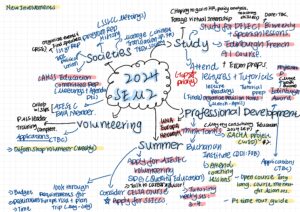Blog by Shirley
Working part time while studying at university is something that a lot of people choose to do, whether it’s at the beginning of their first year or near the end of their graduation. It’s an extremely rewarding experience, packed with essential professional skills and financial incentives, however learning how to balance part-time work with other commitments at university and beyond can be a learning curve. Here are a few time management strategies and things to consider if you’re thinking about getting a part-time job, or wanting to know more about how to effectively balance both work and study without compensating personal down time!
The Reality of the University Hustle
Balancing personal time, academic obligations and part-time jobs can be one of the toughest challenges at university. It’s easy to realize that each area requires time, attention, energy, and often a different mindset, meaning that it can be difficult to seamlessly shift between roles. On the one hand, academic demands at university can be unpredictable. You may find yourself needing more hours than anticipated to finish an assignment or study for exams. On the other hand, part-time jobs can come with their own set of demands, from last-minute shift requests to expectation for peak-season work. It can create pressure on balancing between your work schedule and academic excellence. Personal time, meanwhile, can become easily neglected when balancing study and work, leading to the occasional burnout, anxiety or feelings of isolation as social and self-activities get pushed aside. Not being able to balance between the three can also lead to mental strain from constantly juggling responsibilities and different demands, and failure to do so can lead to guilt or frustration.
Tip 1: Learn how to Prioritize Tasks

How to prioritize tasks is one of the most important things I’ve learnt whilst working as a student assistant at the University Careers Service. I often have to decide whether to answer student queries (which often have a time limit and are easy to complete), prepare resources for events or research an employer (which can be relatively slow and require a lot of preparation time). Prioritizing deadlines based on urgency has helped me avoid last-minute stress, especially during peak times when we receive a lot of demands and queries from students and employers.
Similarly, with my academic commitments such as upcoming deadlines, I choose to swap my shifts with my colleagues in advance to prioritize working on my assignments and revision, leaving room for unexpected tasks or more intensive coursework. Categorizing your work and academic commitments in the short term (such as an upcoming work shift or deadline) or long term (like maintaining overall academic performance) can help you focus on the most time-effective task with better efficiency.
Tip 2: Use Time Blocks and Find your Optimal Routine
Using time blocks and establishing an optimal routine can make an enormous difference when juggling part-time work with university studies. Given the different nature of working shifts and studying for a tutorial or assignment, it’s important to experiment and understand when you work the most effectively independently. This means that you’ll be able to maximize your productivity with the most energy-consuming task, such as researching or writing an essay, which you can dedicate a certain time block to every week. I personally have found that my optimal time block for independent work occurs anytime from 4pm to 8pm, which means that I select shifts for my student ambassador role or work an in-person shift at the Center for Open Learning in the morning. This means I can avoid my least productive hours for independent work and commit to doing more desk-based jobs, keeping my brain active.
I also leave space in my calendar for focused study and downtime. For example, I set a time block every other night for either studying 5pm – 8pm, going to a bookstore, or going to the gym with friends on the weekends. Remember, this is about finding a rhythm and schedule that’s tailored to your productivity level and your own habits, not anyone else’s. Yes, I do believe there’s such a thing as people being generally more productive in the morning as well as late night!
Tip 3: Learn how to plan in advance
As an add on to the first tip, learning how to plan in advance has been crucial for me in balancing work and study commitments. Before each semester, I note down all the key deadlines for my courses and major events that I know require focused preparation, such as a group presentations or hefty tutorial readings. On the work-related side, I also take note of my availability for when I plan to work shifts, as well as when I need to help out during Peak Seasons with signature events working as a brand ambassador for an education charity on campus. Knowing my commitments well in advance allows me to request time off when needed, and communicate swiftly with my coworkers, tutors and supervisors when I need to adjust my schedule.
Tip 4: Utilize Time management tools and resources
Using time management tools has been a game-changer for staying organized and on top of all my commitments. My Outlook calendar is a lifesaver, where I block out specific hours for classes, work shifts, and study time. Having a visual of my schedule helps me quickly see where I have free time or potential scheduling conflicts. For day-to-day tasks, I use a daily and weekly planner to break down larger goals into manageable steps, which keeps me focused on what’s important without feeling overwhelmed.
Notion is another tool I rely on heavily; it’s where I organize everything from project notes to task lists for my roles as a Teach First Brand Ambassador and Resource Center Assistant, which I back up with a good old spreadsheet to give me an overview of key dates and task status. I also use a timer, often for the Pomodoro Technique, which helps me stay concentrated during focused work sessions and prevent burnout. These tools together make it easier to balance my time between university, work, and personal commitments, giving me a clear roadmap to meet deadlines and stay efficient.

In addition to my daily and weekly planners, I also create a mind map at the beginning of each semester to visualize the four pillars of my focus for that term. This method helps me outline my primary goals and responsibilities—whether it’s coursework, part-time work, extracurricular activities, or personal development. By having a clear visual representation of what I need to prioritize, I can better allocate my time and energy throughout the semester. This approach not only aids in organizing my tasks but also keeps me motivated, as I can see how each pillar connects to my overall academic and career aspirations, and reminds me to not drift away from my main focus. It’s a fantastic way to start the semester with clarity and intention.
Tip 5: Learn to say “No” and Know your limits (International Students)
Learning to say “No” may seem easy but it’s actually quite hard in reality, especially if you find yourself feeling guilty of letting people down. Not knowing how to could lead to burnout that sometimes take days to recover from, and further delay your progress with work and study. It comes with practice, and I personally like to set aside dedicated time each week for a personal detox, intentionally distancing myself from outside distractions that can be overwhelming and draining. During this time, I love visiting coffee shops to read, indulging in a good movie, or simply catching up on sleep. This break not only helps me recharge but also allows me to refocus my energy on my priorities. I also sometimes like to arrange socials with friends, such as a big potluck dinner or going to a pub as a way to have some downtime. However, it’s important to remember that the ways to relax and unwind are different for everyone, and it’s crucial for you to discover what works for you. Also, a little reminder if you’re an international student, especially if you’re thinking of getting a part-time job in the UK on a tier 4 student visa, it’s important to keep track of your working hours as the 20 hour weekly limit does apply when you have a part-time job!
I hope these tips can inspire you to find a balance between your studies and a part-time job, as the rewards often far outweigh the challenges. Not only does working part-time provide invaluable experience and skills that enhance your employability, but it also allows you to build a network of contacts within your industry. Each role I’ve taken on has offered unique insights and opportunities for personal growth, whether it’s developing my leadership abilities as a student ambassador or sharpening my organizational skills in the Careers Service. Even the fact that you’re balancing your work and study schedule shows excellent time management skill!
Ultimately, the journey of juggling studies and work has taught me resilience and adaptability, traits that are essential in today’s fast-paced world. Embracing this balance has not only enriched my university experience but also prepared me for future challenges beyond the classroom. So, for those considering a part-time job, remember that while it requires dedication and effort, the lessons learned and the connections made can be incredibly rewarding. Thank you for reading and stay tuned for more posts from me!



